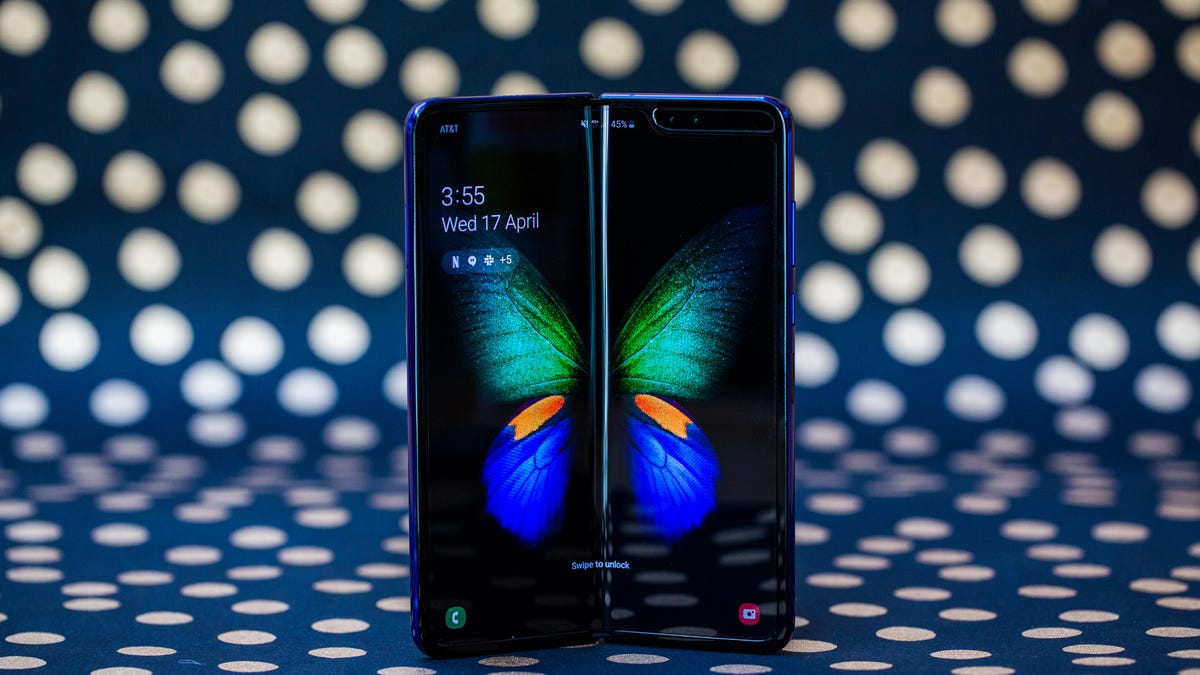Galaxy Fold delay a blow to Samsung, but it's no Note 7 disaster
Commentary: It could have been so much worse.

The screen on the CNET review unit of the Galaxy Fold hasn't malfunctioned. But that doesn't mean there aren't problems.
Samsung should be taking a victory lap right now for its innovative Galaxy Fold. Reviewers should be singing the praises of the first major foldable smartphone, which was supposed to launch Friday. The only controversy should be whether that $1,980 is really worth it.
But we don't live in that reality. Instead, all we can talk about is its potential to fall aprt. Samsung on Monday delayed the launch of the Fold following reports that some of the small number of devices seeded to reviewers began to malfunction or break. The CNET review unit, handled by editor Jessica Dolcourt, hasn't suffered the same issues.
The delay is not just a black eye for Samsung, but for consumer confidence in foldable phones in general. These flexible and bendable devices are supposed to represent a revolution for smartphones , but they can hardly take off if people are worried about their durability. And given the high prices for these devices (just look at the $2,600 Huawei Mate X), you have a right to expect that this phone, well, actually works.
But here's the thing: This whole mishap could have been so much worse.
Samsung should be thanking every reviewer who played with an early unit of the Fold. Just imagine if units got out to the wider public. The outcry would be far greater, as would the criticism that Samsung rushed out a half-baked product just to be "first."
Read: The Galaxy Fold can't have this one useful thing
The knee-jerk reaction would be to compare this incident to the Galaxy Note 7 debacle, where Samsung slowly responded to the initial reports of the devices catching fire, only to have it blow up, quite literally, in its face. But that's an instance where consumers already got their hands on the phone. That Samsung is taking the high-profile, if embarrassing step of delaying the launch shows it's learned its lesson.
"Samsung delaying the Galaxy Fold shows maturity," Avi Greengart, an analyst at Techsponential, said in a tweet.
Samsung, which has built over 4 billion phones since 1988, was caught by surprise by the Note 7 problems. Like most companies in the mobile industry, Samsung had counted on its battery suppliers to conduct safety tests before putting the batteries in devices. As it turned out, those suppliers didn't catch the errors that caused the Note 7 to overheat.
The Note 7 debacle caused Samsung to be a bit more cautious with its subsequent devices. It packed a smaller battery into 2017's Galaxy S8 and instituted a more rigorous battery testing process. But its new procedures, largely designed to detect battery problems, didn't uncover the issues experienced by the Galaxy Fold's display.
The inward fold of the Galaxy Fold adds strain to the device.
The screen failures would've been amplified had they reached consumers and not just early reviewers. The foldable phone market is on wobbly, hype-filled legs, and the first impressions so far have been mixed. The Royole Flexpai was an interesting, but buggy product. The Mate X impressed people at MWC 2019, but it wasn't widely available to test. Now, there's this controversy. A few bad products could blow this trend before it has a chance to become a thing.
Ahead of the launch, other industry players noted that the inward fold of the Samsung device adds strain on the display, which is why Huawei and Royole opted to do displays that folded out. Samsung reduced some of the tension on the fold by including the large Surface Book-like gap in between the two folded sides, as well as added that screen protector that we only now know is something you absolutely need to keep on the phone.
Samsung says it's identified a possible early cause. The company said the initial findings from its investigation found potential damage from the impact of the exposed areas of the hinge at the top and bottom of the phone. It also said substances found inside the device might be affecting the display performance.
"We will take measures to strengthen the display protection," Samsung said in a statement. "We will also enhance the guidance on care and use of the display including the protective layer so that our customers get the most out of their Galaxy Fold."
While there aren't any victory laps in Samsung's near future, the company has the opportunity to fix its issues with the Fold early and preserve the prospects for the broader foldable smartphone market -- assuming it's nothing catastrophic that requires a full redesign.
It only took a handful of defective review units. That's a small price to pay.
Shara Tibken contributed to this story.
The story originally ran on April 22 at 11:28 a.m. PT.
Updated on April 23 and 24: With additional background.

